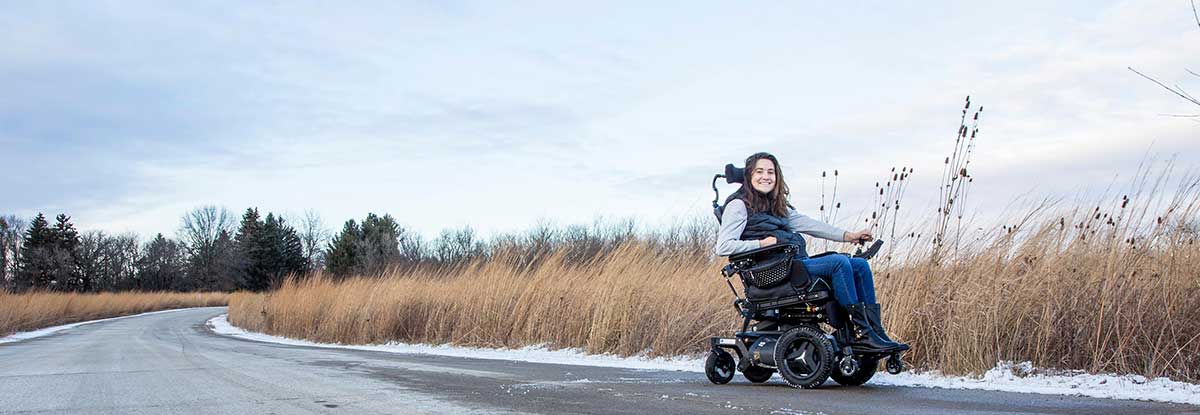
Amber Rangel hits the open road! Since her accident in 2014, Amber has harnessed the power of the outdoors to live her best life.
July 27, 2014, is a day that changed the course of 28-year-old Amber Rangel’s life forever.
It was on this day eight years ago when a semi-professional barefoot water skiing accident left the 20-year-old Amber with a broken arm and C5 spinal cord injury that resulted in paralysis of both her upper and lower body. Her life as she knew it was changed forever.
Amber was born on May 21, 1994, in the small midwest town of Caledonia, Illinois to parents Joe and Tracy Rangel. The Gemini grew up living a country lifestyle with two older sisters, Adora (30) and Ariel (32). While the township of just under 200 people is not necessarily a mecca for outdoor sports, Amber grew up competing in water ski shows – a.k.a. Tommy Bartlett style – on the nearby Rock River during the summer and swimming competitively at the YMCA in the winter. As Amber matured, amateur barefoot water skiing became her main focus, competing in three-event tournaments – slalom, jump, and trick – with her creme de la creme being the trick category. She was athletic in every meaning of the word but didn’t necessarily consider herself an “outdoorsy” type. That was until, in her late teens, when things began to change.
While the brown-haired, brown-eyed girl was by no means addicted to drugs and alcohol, in 2013, she recognized that she was on an unhealthy trajectory in life. She decided to take matters into her own hands and form a new, fresh, healthier lifestyle with a move to Colorado Springs part-time. Traveling back and forth from Colorado to Wisconsin – from rock climbing and hiking to water skiing – Amber was living the life she sought. She was enjoying the star-gazed, happy and healthy Colorado lifestyle while competing in barefoot water skiing competitions on the weekends. She was finding that coveted connection to the outdoors that she had always wanted until one week when she didn’t come back to Colorado after that fateful weekend when everything changed.
It was during a jumping event on that Sunday in 2014 that Amber’s new life took an abrupt turn. She fell three feet before the jump, face-planted with her hands out in front of her, her right arm broke backward, snapping her arm and the elbow, catapulting her through the air “Superman-style” before hitting the water at over 40 miles per hour, breaking her neck in the process. But it wasn’t known at the time what exactly had happened because, according to Rangel, typical falls at that speed usually result in confusion about what’s up and what’s down. It wasn’t until her PFD pulled her to the surface and she realized that she couldn’t move that things took a turn for the worse.
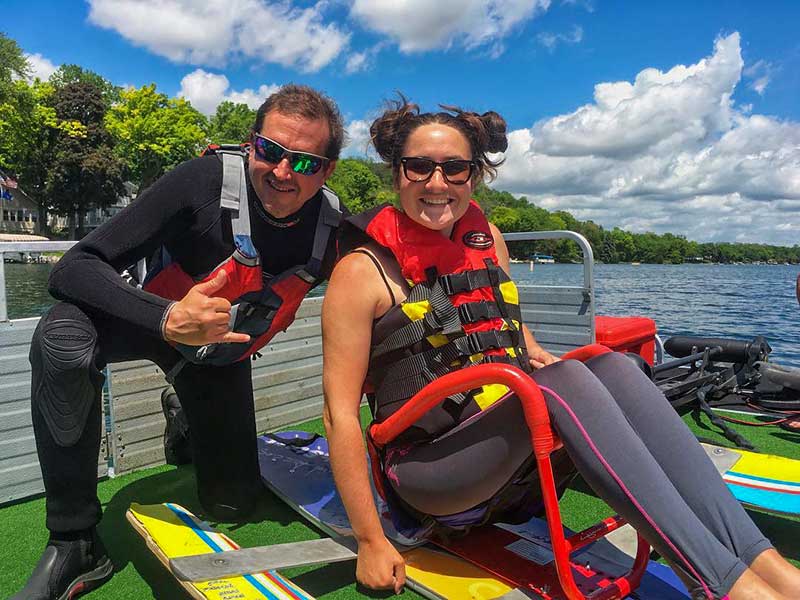
Amber is all smiles on an adaptive water skiing day. It was during a water skiing jumping event in 2014 when she suffered an injury that would change the course of her life.
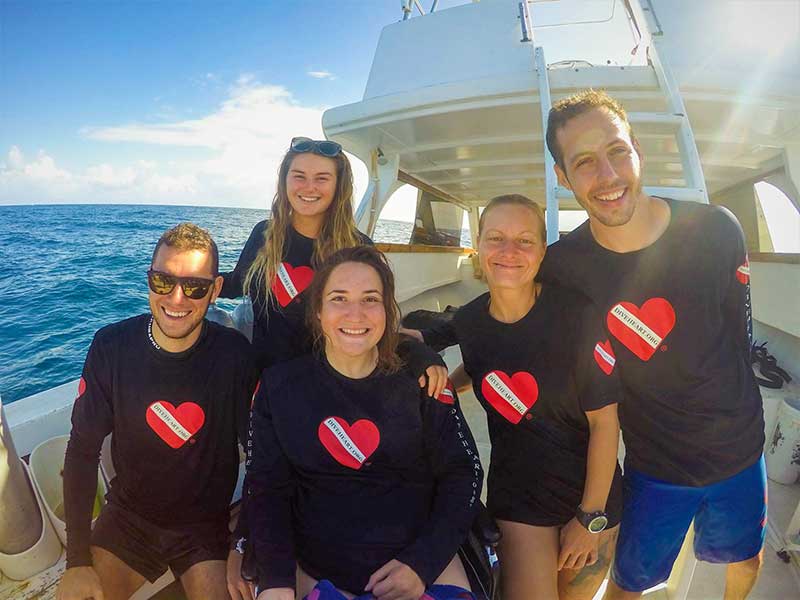
Amber takes a minute to pose on an adaptive scuba diving adventure. Scuba was one of her first activities to take part in post-injury.
“I panicked and thought to myself that I was in spinal shock or maybe even paralyzed,” recounts Amber when thinking back to that moment. “I was a lifeguard when I was younger, so I knew there was definitely something wrong going on and I wasn’t skiing away from this. I was like take a minute, let the wetsuit pull you up, and don’t fight this one as it kind of hurt. When I got to the surface, I felt my shoulder blades hit the surface and when I went to turn right, twist my head, and get air, I took that first breath thinking I was going to turn. When I didn’t turn, I immediately thought, Oh my gosh, I’m paralyzed. I’m not moving and nothing is moving right now. So I told myself to hold my breath long enough for the boat to turn around and get me.”
But Amber couldn’t breathe. When she opened her eyes into a yellow haze of river water, she immediately started to suffocate as the water entered her esophagus with each waning breath. She drank water until the boat finally reached her, and, luckily for her, a Navy veteran was on the boat. He jumped in, flipped her over, and treaded water while the rest of the crew went to get cell phone service and call 911. It wasn’t immediately known what had physically happened to Amber, but like her own recount of the events, it was obvious to everyone involved that something was seriously wrong.
“It was quite an intense moment,” she remembers. “We were all running on pure adrenaline at that point and I was just screaming ‘tell my mom I love her’ and other similar things that anybody who thinks they’re dying would scream. I don’t think that they knew I was paralyzed, I think they thought I had just hit my head and passed out. I don’t think they knew that I couldn’t move. When they flipped me over, I was unconscious and purple, but I spit up water a couple of moments later. I remember the water, I remember drinking it, and then I remember not being able to move.”
So, there she was, with her very own Navy Seal treading water for over 15 minutes, waiting for help to come. Amber remembers the waiting game like it was yesterday.
“It was a lot of me thinking to myself to hold on just a little bit longer,” she says. “I was just trying to visualize the boat coming to rescue me and kept repeating to myself ‘you’re not going to drown right here, right now. They’re clearly going to help you out.’
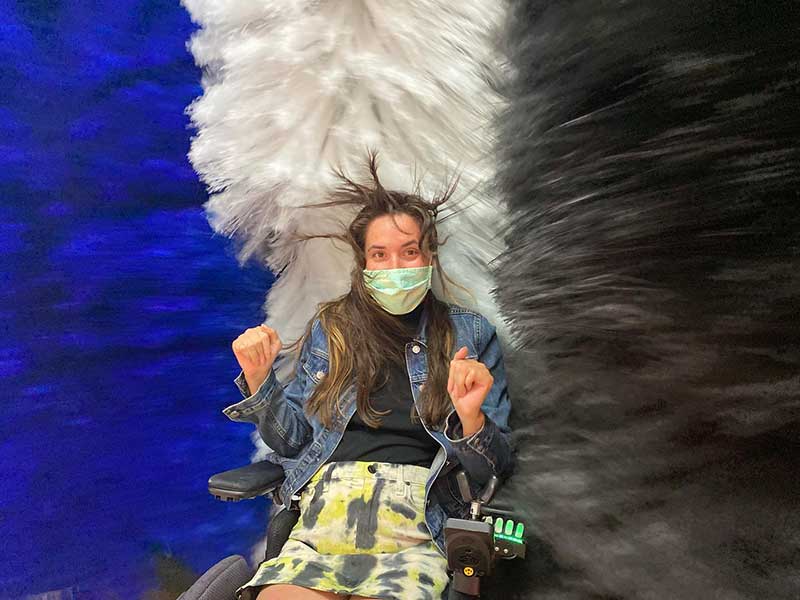
Having a little fun with static electricity. Going from being a semi-professional athlete to not being able to feed or dress herself was quite a 'shock' to her psyche.
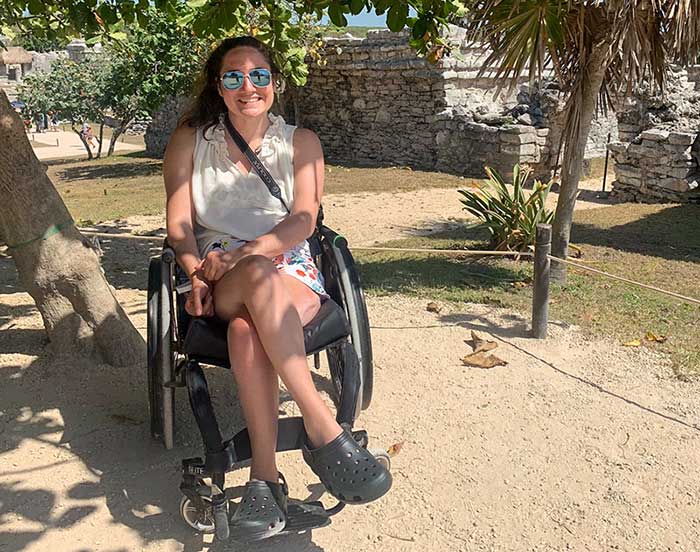
Amber takes a rest stop to pose for a picture on vacation. Through scuba diving, she was exposed to a lot of travel and different cultures in the first two years after her injury.
And they did help out. Volunteer paramedics and firefighters reached the site of the accident and transported Amber to the University of Wisconsin Health University Hospital in Madison where she spent two-and-a-half days in the intensive care unit treating her injuries while learning how to navigate her new life as a C5 quadriplegic. Four-and-a-half months at the Shirley Ryan Ability Lab (formerly the Rehab Institute of Chicago) and she was back home to her family. But, it’s not lost on Amber how it could have very easily been a totally different outcome.
“I’m grateful that they (the paramedics) even showed up in the first place because they didn’t have to,” Amber remembers. “But I’m most grateful there was a former Navy Seal on that boat because he has training and knowledge that none of us would have ever had. If he wasn’t able to tread me in the water, it would’ve been over. In a current on the river, how is that even possible? I don’t know what he did in the Navy, but dude had it when it came to the moment.”
With the moment now over and the rest of her newly imagined life in front of her, reality set in. A reality that Amber tackled with the maturity of someone twice her age. Yes, she was naturally upset, confused, and scared about what was to become of the rest of her life, but was able to somehow continually find the positives in the situation. She thought to herself, “I was never put on a ventilator, didn’t contract pneumonia, never got bed sores, had no internal bleeding, and had no bruises to her face.” It would seem that somebody might have to remind her that she had a broken arm and spine! However, her family was there to support her from the very start, and they were all simply happy that she was alive to see another day, wheelchair or not.
“I vocalized that I was paralyzed, that I couldn’t move my arms and wouldn’t be walking again,” Amber said to her mother, father, and sisters. “It was a very positive attitude from the very beginning and when I would get sad or depressed, my family would immediately redirect my thoughts. If I said things like ‘my life is over,’ my sister would give me an affirmation that this part of my life might be over, but we have to think about the future and be positive about it. Since then, there have been so many great things that have happened to me since breaking my neck, it’s not even comparable.”
That list of amazing things includes adaptive climbing, adaptive snow skiing, adaptive scuba diving, adaptive sailing, receiving her Associate of Arts degree, traveling, and even getting back to enjoying the outdoors and what nature has to offer, as she was doing just prior to her accident. While she could’ve just given up, there’s simply no quit in Amber Rangel.
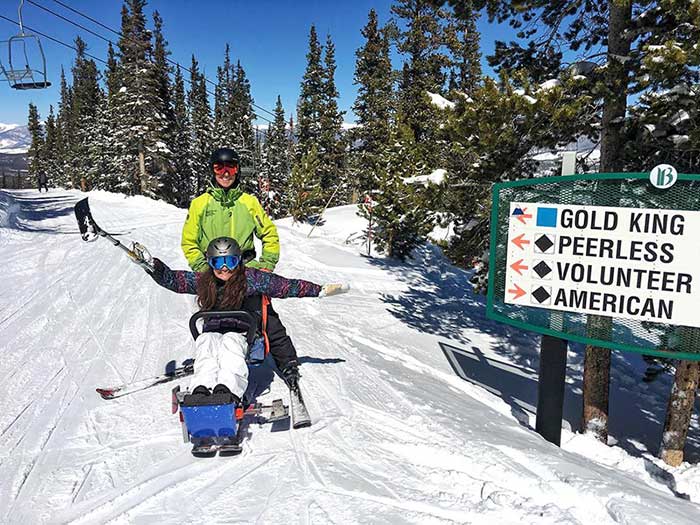
On an adaptive ski lesson with the BOEC. Adaptive skiing helped Amber get back to enjoying the outdoors after the accident.
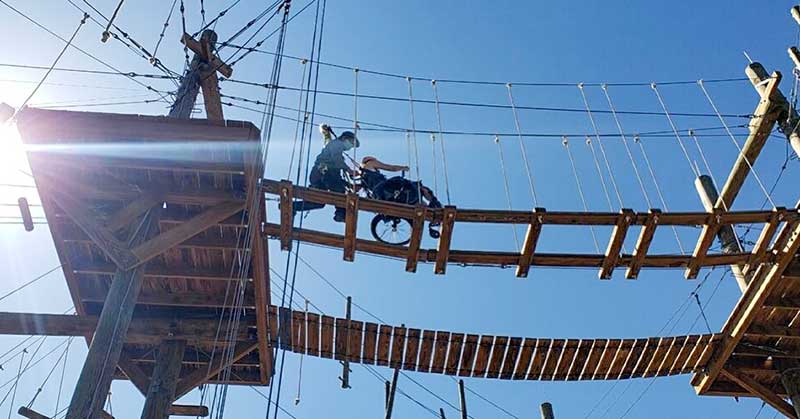
Using the outdoors to live her best life includes tackling an adaptive high ropes course.
Due to the nature of her injury, Amber certainly didn’t sit back and wallow in her tears. She needed support with most activities of daily living and couldn’t raise her arms above her head. But a few surgeries over the years helped the dynamo obtain more independence. Approximately a year after her injury, a bladder augmentation procedure – or Mitrofanoff – was performed so she could use the bathroom independently. Then, three years later, a tendon transfer surgery gave her back the use of her triceps so she could do things that most people take for granted … pinching the phone, grabbing her backpack, or simply changing the pages of her university textbooks. According to Rangel, both surgeries were game changers.
“Prior to those surgeries, I couldn’t take care of myself that much at all,” says Amber. “I kind of wish I had done the full body makeover immediately, but they were really intense surgeries to become independent where I’m at now, so I couldn’t really imagine doing it all at once, but I wish I had done it sooner. I can now get my own water, I can literally grab stuff instead of having to ask somebody to do it for me.”
While Amber was getting “back on the horse” so to speak, with her newfound adaptive outdoor adventures, it definitely took some time to get to where she is today. For at least the first few years, she felt compelled to put on a front that things were alright. When she was feeling depressed and expressed that she didn’t want to go hang out with “a bunch of disabled people today,” parents Joe and Tracy would be forced to practice some tough love.
“I would be like that’s not really my vibe, no thank you,” she remembers. “They would say, ‘you wanted to do this, this is a commitment and you can’t go back on that. You need to try it and have fun.’ They would get me into my chair, put me in the car, drive me there, and if I didn’t want to talk to anybody when I got there, then that was on me. My character would shine through in moments like that if that’s how I chose to be.”
All it took was a few lessons in humility and character checks and Amber was well on her way back to the pre-accident Amber, albeit in a new way. Her inner voice started to make the shift from “pity on me” to not letting her situation define her as a person. Going from a semi-professional athlete to not being able to feed or dress herself was quite a shock to her psyche, and even somewhat embarrassing for her. But Amber felt like she had something to prove.
“I learned to let go of some of those feelings and get my butt back out there,” Amber reflects. “I couldn’t let them think that this had slowed me down. I wanted people to think, ‘wow, that didn’t slow her down!’ But at the end of the day, I would still go home and cry. So, it did slow me down, but for somebody that was just glimpsing at my life, they would have no idea. I didn’t expose myself like that to people.”
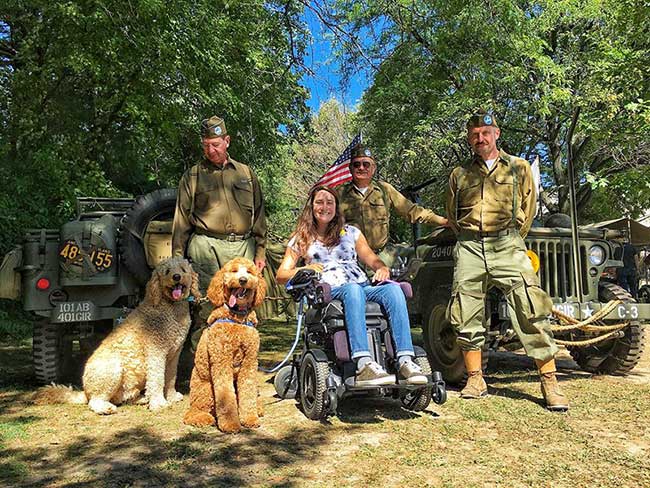
Amber's physical therapist challenged her to be an advocate for herself and get out there and go on vacations.
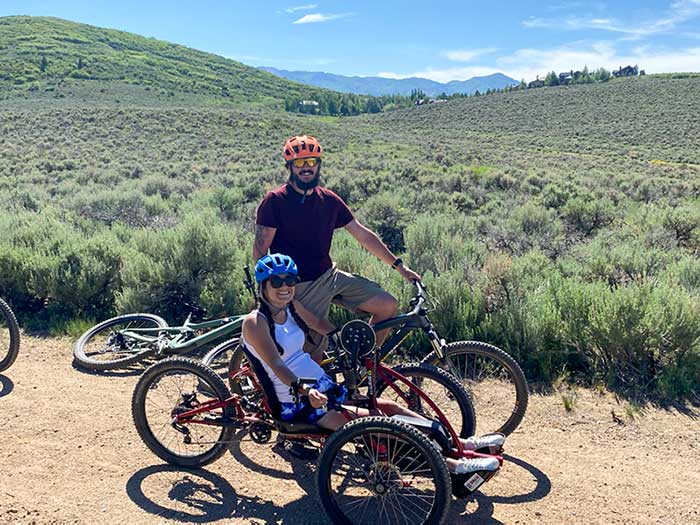
Adaptive cycling is another activity that Amber partakes in. Best thing is that she can do it with her partner Ryan.
While it would have been extremely easy to just sit back and let her new life unfold in front of her, Amber took the “bull by the horns” and did get her butt back out there. Whether it was the extremely positive support from her family, the constant pick-me-ups from her physical therapist, or just the fact that she felt like she had to prove something, the Amber of the future was ready to go. She came back to Colorado to ski with the Breckenridge Outdoor Education Center’s (BOEC) Adaptive Ski & Snowboard Program, something she refers to as a “life-changing experience.” While she had experienced some adaptive skiing on “garbage mounds in Wisconsin,” early on, the four days on the hill with BOEC staff in the winter of 2019 were game-changing.
“Putting my trust in the (BOEC) instructors and volunteers in an extreme situation like that was a new feeling for me,” says Amber. “We were getting on huge lifts, going up into the mountains, and weren’t going to be back for a while. It is a great team-building experience, the trust, the relationships, the connections. Even just sitting on the chairlift for brief moments with the interns or instructors. It’s a one-of-a-kind experience.”
Then, last summer, in July 2021, perhaps her most extreme experience to date came knocking. Amber’s partner, Ryan Helgerson, a Navy veteran, found out about BOEC’s Heroic Military Program for veterans. Designed to meet the unique needs of those who have been injured while serving our country and are now faced with new challenges associated with recovery, this program seemed to be a great fit. And because family members are critical to the healing process, Amber was invited to participate in the Heroic Families River Trip for four days of camping and rafting the Colorado River with fellow veterans and their families. Neither she nor Ryan had ever been in the backcountry like this, so they were both amazed, to say the least. Not only were they impressed with the teamwork and leadership skills displayed by the BOEC staff members during the trip itself, but with the extreme caution and professionalism shown by the BOEC when considering Amber’s application.
“When it was time to plan the trip, the BOEC mentioned that it’s not typical for quadriplegics to be able to go on excursions like this,” Amber says. “It was a concern from the start, so it made me feel good that I wasn’t just signing myself up with just anybody. There were red flags, so that made me feel good and it reassured my family that they (BOEC) are professional, know what’s going on, and want to be prepared for what’s coming.”
The couple went on the trip and were in awe of the entire experience. Ryan, in particular, had never been around a military support group before and was pleasantly surprised by the experience. The connection to the other veterans and exposure to the elements was new ground to cover for the veteran. Amber saw this as a once-in-a-lifetime experience for her beau.
“He had no idea there were programs like this,” says Amber when she brought the subject up to Ryan. “When he realized that we were going to go on this rafting trip and they’re going to provide a stipend – you don’t have to worry about your flight or what you’re going to eat – he was taken aback by it. He didn’t believe me, he thought I was lying.”
“It was easily one of the best experiences of my life, being out there in nature separated from all of the distractions in life,” says Helgerson. “The trip really built me as a person and has helped me to be mindfully present and enjoy the world around me.”
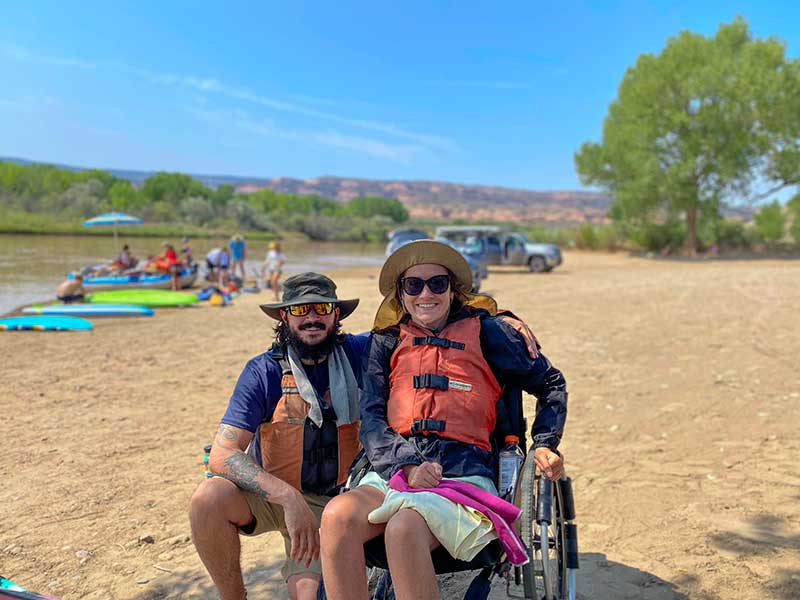
Amber and Ryan - a Navy veteran - took part in a BOEC Heroic Military Program rafting trip in 2021.
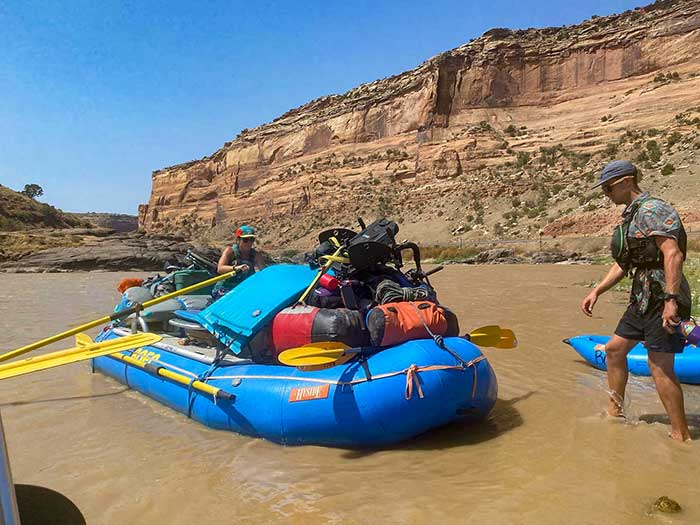
A lot of equipment, including a wheelchair, is necessary to get Amber on a rafting trip. She loved the fact that BOEC spent a lot of time preparing for a quadriplegic to safely get out on the water.
Amber agrees. “The camping, the thunderstorms, the rafting, the experience affected him differently than it affected me,” she adds. “I know it did. It definitely kickstarted some motivation for him. I think even just being surrounded by family and knowing that there were other men going through similar situations, it really helped him to not feel as isolated.”
And that camaraderie between fellow veterans and the 28-year-old Helgerson seemed to be magical.
“There’s a mutual love and respect amongst veterans that is indescribable,” he says. “Being able to go from a group of strangers to one big and wild family in a week’s time was unlike anything I have ever experienced. It taught me that no matter what, there are people out there who have my back, and love me for who I am.”
Now with the rafting trip in the rearview mirror, but never forgotten, the motivated and driven Amber continues to defy the odds and overcome adversity to live the best life she knows how. She’s on the cusp of entering her senior year at the University of Illinois, where she will be living in the dorms as a 28-year-old for the first time this fall. She’s maintaining an internship with Shirley Ryan Ability Lab’s Adaptive Sports Program, has an all-women’s scuba diving trip scheduled for October, and plans to continue carving time out for the healing and therapeutic benefits of spending active time in the great outdoors akin to her pre-accident times in Colorado.
“Thankfully, through organizations like the BOEC, I am not only able to go back to Colorado, but I am able to reconnect with the outdoors the way I want to,” she says. “With the resources, skills, technology, tools, and equipment available to me, it’s now possible to pause and go back to those moments.”
In terms of what the future holds for the self-proclaimed “loud mouth,” Amber imagines something bright, outdoorsy, and ultimately, happy.
“Yea, I want to be happy,” Amber says with a smile. “I think for a long time I’ve been trying to catch up to something that’s unrealistic. Now, I think I have a pretty good idea of what happiness and independence looks like and I’m going to chase that dream.”
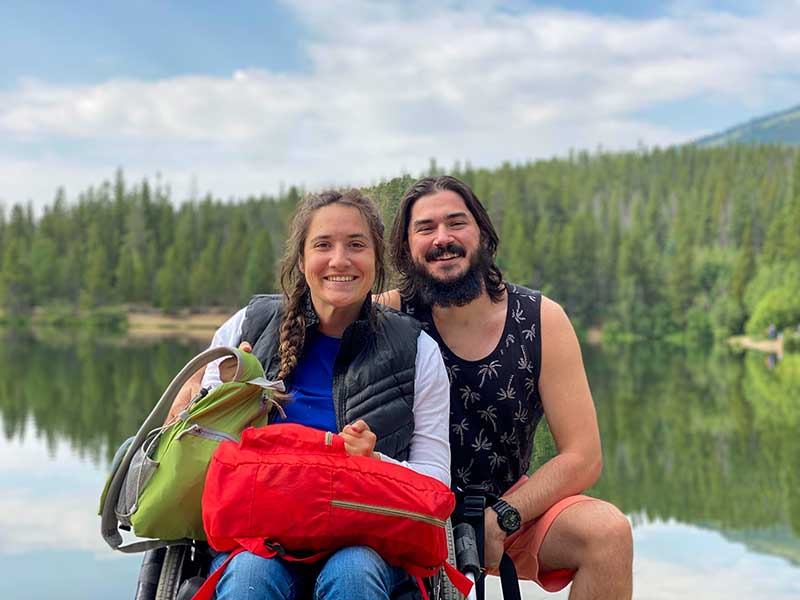
Amber and Ryan take a break at BOEC's 39-acre Wilderness Campus.
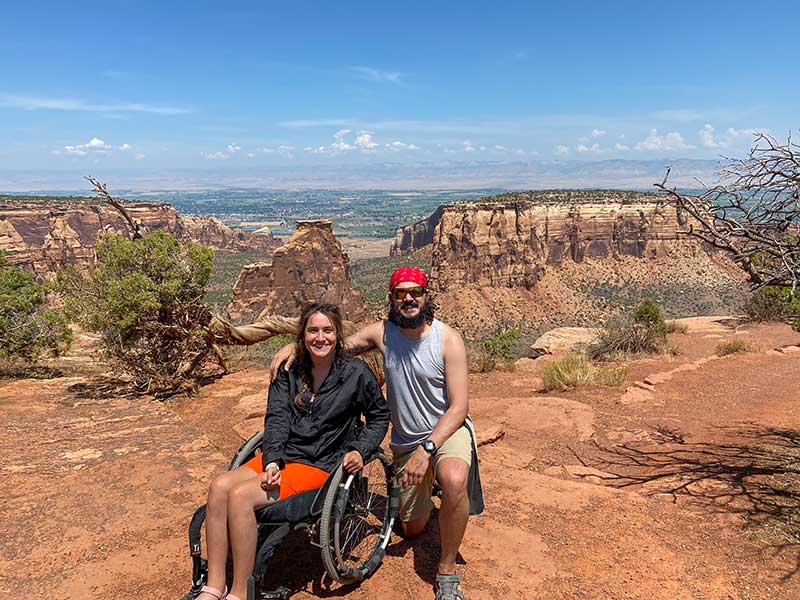
Amber and Ryan truly are living their best lives. She imagines a future for herself that is bright, outdoorsy, and ultimately happy.
Did you know that BOEC is able to keep its lesson fees low for participants like Amber so we can remain as inclusive as possible? We rely on generous donors to make up the difference. To make a tax-deductible gift, please visit BOEC.org/give today.

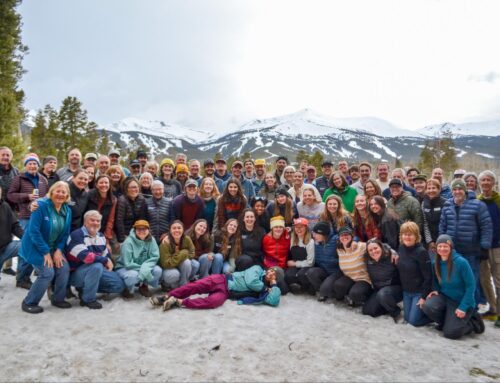
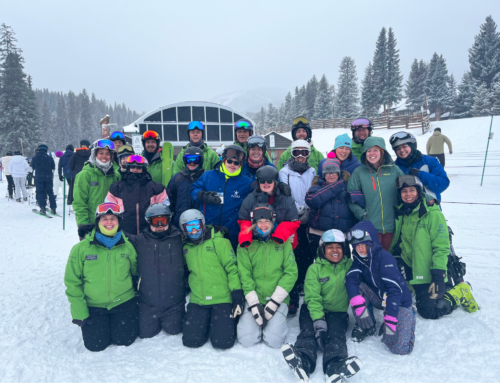
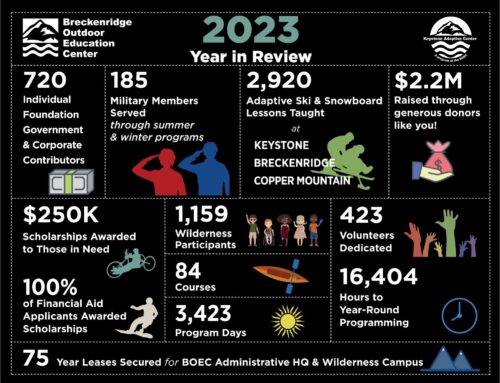

Leave A Comment